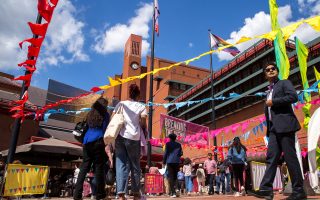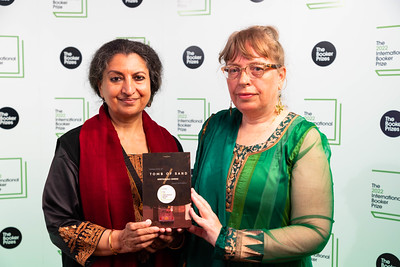Finding Home marks the 50th anniversary of the Ugandan Asian exodus. In August 1972, Ugandan President Idi Amin ordered the country’s Indian and Pakistani communities to leave within 90 days. Many of the displaced were British citizens and, as a result, around 27,000 people emigrated to the UK, with thousands settling in Leicester. Finding Home features three new short plays by local writers Chandni Mistry, Ashok Patel, and Dilan Raithatha whose families arrived in the UK from Uganda.
Q. Why was it particularly important to you to work on this commission?
CM: My Dad is from Uganda and my Mum from Kenya so it’s really important for me to be able to look into their experiences that then have shaped my upbringing and my life.
AP: I was born and brought up in Leicester and I have seen the impact that the Ugandan Asians have had on this city. My wife’s family were expelled from Uganda and arrived in the UK in November 1972. I portrayed a fictionalised account based on the journey they made from Soroti to Entebbe Airport via Kampala in a short story which was short listed by the Asian Short Story prize in 2017. It was published in an anthology of short stories called Dividing Lines by Dahlia Books. This really boosted my confidence and it was a catalyst to writing more short stories. I would really encourage anyone who wants to write to get involved with local writing groups and enter competitions!
I have had a longstanding interest in the Ugandan Asian expulsion and the complex relationship between the Asians and Ugandan Africans. So, I have been thrilled to be one of the writers of the Leicester Curve community play Finding Home and I have enjoyed writing my play ‘Ninety days’. Leicester Curve theatre are helping to involve more members of the communities that make up the rich fabric of the city in all aspects of theatre and to see the theatre as a space that reflects their lives.
DR: This story runs through my family and community. I grew up listening to stories of how my family and community were kicked out of Uganda but this was never covered in a wider context. I wasn’t taught about the expulsion in school, never saw it on TV or theatre. As I got older and more curious about my upbringing, I learnt that the Ugandan Asian community felt as if they were being forgotten. Finding out that the community would play a part in shaping the story of this play was a very important factor in my decision to be a part of this project. Having them properly represented and giving them a voice is the most important thing and that is exactly what Curve want to do.
Q. What did the writing process involve?
CM: I went to Uganda in 2019 with my Dad to retrace his steps as child. We visited his old homes, schools, temples and places he would play.
From that, my imagination was fired up and I wanted to bring those feelings and images to life to an audience who may have never seen Uganda. We also ran Chai and Chat sessions in the local community where we met people who went through the Exodus and also people who lived in Leicester at the time and welcomed the Asians in. These stories were such an inspiration to me and I’ve weaved different ideas and thoughts together to create my piece.
AP: We started with a series of workshops where we met Ugandan Asians, their families and anybody affected by the Ugandan Asian experience. We listened to their stories, and tried to get a feel for their thoughts, feelings and emotions.
DR: We organised “chai and chat” workshop sessions where we invited members of the community to share their experiences and hear what they would like to see on stage. It took a while to earn their trust and get them to open up, but once they did, you can see they were excited to have a chance to have their voice and community truthfully portrayed on stage. It was a quick turnover and we have all had to have had a lot of trust in each other over the process.
Q. Tell me more about how you worked to unearth stories from the community?
CM: It took time and effort to engage with the local communities. The people who had been though the experience wanted to always talk about the happy moments, it was tougher getting into the details.
AP: I think it was important to create an ambience where people could be comfortable and have trust in us. We wanted to hear stories but also reflections and thoughts about their experiences in Uganda and Leicester. It was important to ask clear questions and listen to their experiences. We also tried to encourage reflections of the past to inform how we all relate to each other cohesively.
DR: We gave them the freedom to talk about whatever they felt necessary. Although we came prepared with questions, it was evident that they had a lot of experiences that are not spoken about openly in public that they felt necessary to be a part of the story. We had to earn their trust and had a genuine, personal conversation with them in order to get them to open up. We went to them as opposed to making them come to us as we felt they would be more comfortable in their own relaxed environment.
Q. What was the community response like?
CM: Really amazing. People at first were a bit reluctant to talk. It took us building trust and being patient and lots of tea and biscuits! But the more we visited they more they began to trust and open up. People specifically came back to see us again and brought Passports and artefacts and plane tickets to show us the journey they had been on.
AP: Many of the workshop participants were in the older age groups. They had strong memories of their lives in Uganda and in the UK. We got a real sense of what they went through as they rebuilt their lives and made a home for themselves and their families in Leicester. The response was a little more muted from people in their 20s and 30s.
DR: It was slightly reluctant to start off with. Theatre is an alien world to them and they did not know what our intention was. They were confused why we were so interested in their story. After many cups of chai and engaging in conversation with them, they opened up and more and more members were joining weekly. At the beginning we were trying to prompt them with several questions in order to get them to open up but towards the end, we were staying hours after our scheduled time as we were enjoying our conversations. It was heart-warming to see how happy they were to tell their story.
Q. What surprised you most about these stories? Did you uncover anything you didn’t know before?
CM: I think it’s the admission that there were two sides to the story and that most people don’t want to discuss the other side. It’s easy to remember the happy moments, I guess it’s safer to remember the happy moments. It’s the more difficult and more soul searching bits to figure out where we might have gone wrong and why things may have happened the way they did.
AP: I was struck by the honesty and openness of the participants. I learnt so much from them! We spoke to a participant who had stayed in a Resettlement Camp for eight months after arriving from Uganda with her family. I had never heard of a stay in a Resettlement Camp for so long. It was fascinating to hear the stories of life in the Camp and it inspired one of the scenes in my play.
DR: It was surprising how unique every single story was despite them being part of the same experience. The violence and fear is unimaginable. There are experiences this community overcame that I cannot even fathom. I thought I had a decent grasp of the expulsion prior to the workshops but internet, newspaper and book research can only get you so far. Hearing straight from the source gives you an entirely different, personal outlook.
Q. Who would you say you are creating this piece for?
CM: For a community that doesn’t normally go to a theatre to feel represented. But equally it’s a story for anyone who wants to learn something new.
AP: Everybody! Hopefully it attracts people who enjoy going to the theatre, but also people who have never been to the theatre before.
DR: Several people. For the Ugandan Asians who went through the expulsion, this is their story and their voice finally represented on stage. For those who want to learn about the making of Leicester and history of Ugandan Asians, this is the perfect opportunity to do so. For South Asians who have never seen themselves or their family accurately represented on a stage, this will be a chance to do so. This is an important event that should not be forgotten and everyone is welcome to be informed, be educated and show your appreciation and respect for the community.
Q. Do you feel that more needs to be done to see our stories on stage? Is there enough representation of the British Asian experience in other mediums?
CM: It’s getting better, it needs more work and more building trust within the community. And actually listening to people. The trouble is it takes a long time, years, so things are changing but it’s a slow and long process. It will be worth the wait.
AP: Theatre should portray stories rooted in cultures that make up the society that we live in. British Asians should be encouraged to participate more in all aspects of theatre and equally theatre should be made more accessible to them. The British Asian contribution and experience needs to be encouraged further in literature, film and television. It is the arts that affect the hearts and minds of people and helps shape a more cohesive society. It is the arts that affects our emotions and enhances our mental health and they are needed more now than ever.
DR: Absolutely more needs to be done. Growing up, I never saw myself represented on stage. It took several years to convince my family to support my career in theatre as they did not think the arts was a viable career for a British Asian. I still don’t see enough today. The stories are there, the talent is there and I hope the demand is there. I hope more theatres give British Asians a chance to have their voice on stage. I can see some positive change but we still have a long way to go. Projects such as this are particularly encouraging and long may they continue.
Chandni Mistry is an actress and writer living in Leicester. Chandni has a passion for creating diverse, engaging and interactive family theatre. She has written and performed in her family show ‘Roti Moon’ which will continue its tour later this year. Her acting credits include, George’s Marvellous Medicine (Curve, Leicester and Rose Theatre Kingston), Maharajah and the Kohinoor (UK and USA tour), Stig of the Dump (West End).
Dilan Raithatha I am born and bred in Leicester and was a part of local acting group ‘Urban Young Actors’ for 4 years before becoming a part of Curve Young Company in 2014. I graduated in Acting at Arts University Bournemouth and after moving back to Leicester, I decided to write my first full length script about my hometown called “Little India”. In 2021, ‘Little India’ had won the ‘Masterclass Pitch Your Play Award’ in association with Theatre Royal Haymarket and was showcased in the West End in October of the same year. I have accepted a place on Bush Emerging Writers Group 2021 and look forward to showcasing a newly written play at Bush Theatre in Spring 2022. I also have monologues that will be published in “Hear Me Now: Volume 2” in association with Tamasha Theatre which will be released in 2022.
Ashok Patel My background is in the biomedical sciences and I teach at Birmingham City University. My introduction to the arts was through writing and performing stand-up comedy in the late 1990s. My short play Jeevan saathi; Life partner was one of three short plays under the title The Cornershop (The Hawth Theatre, Crawley 2000, directed by Dominic Rai) and went on national tour in 2001 and later broadcast on Radio 4. I have been involved in projects working with communities resulting in short films Obsession (Sampad, 2003), Chahana (Arts in Sandwell, 2004) and a short play Multicultural? (Arts in Sandwell, 2006). My film script Cathy and I (Script and Lighthouse, 2006) won an RTA Award 2005 and short-listed for the Satyajit Ray Film Festival 2006. My play Ninety days was showcased as a rehearsed reading at the Midlands Arts Centre in 2018. I have had two short stories published, Ninety days and Milly.
Finding Home runs at Curve Theatre until 6 August.


